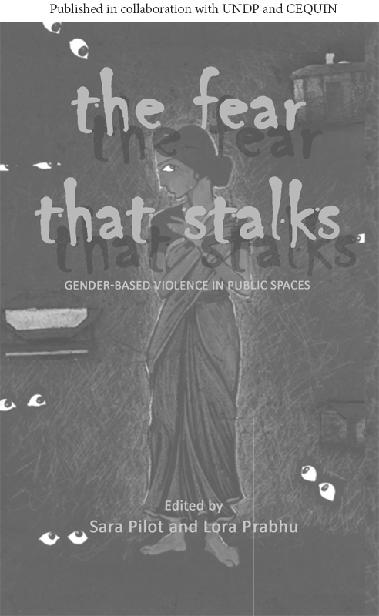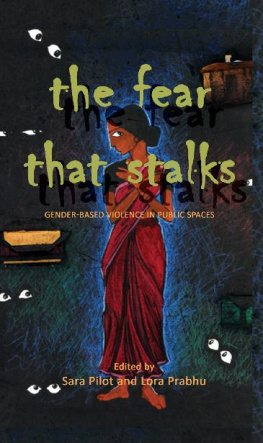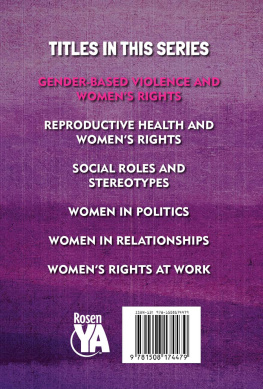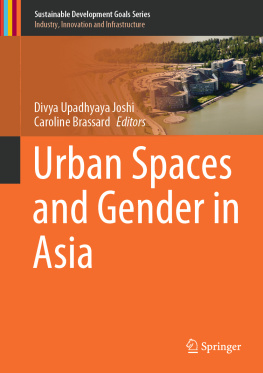
ZUBAAN
an imprint of Kali for Women
128B Shahpur Jat
1 st floor
New Delhi 110 049
Email:
www.zubaanbooks.com
First published in English (2012) by Zubaan
Copyright this collection Zubaan/Cequin 2012
All rights reserved
10 9 8 7 6 5 4 3 2 1
eBook ISBN: 9789383074112
Print source ISBN: 9789381017135
This eBook is DRM-free.
This publication is supported by UNDP India. The views in it are those of the authors and do not necessarily reflect those of the United Nations Development Programme.
Zubaan is an independent feminist publishing house based in New Delhi, India, with a strong academic and general list. It was set up as an imprint of the well known feminist house Kali for Women and carries forward Kali's tradition publishing world quality books to high editorial and production standards. Zubaan means tongue, voice, language, speech in Hindustani. Zubaan is a non-profit publisher, working in the areas of the humanities social sciences, as well as in fiction, general non-fiction, and books for young adults that celebrate difference, diversity and equality, especially for and about the children of India and South Asia under its imprint Young Zubaan.
Typeset in Adobe Thai by Jojy Philip, New Delhi 110 015
Printed at Raj Press, R-3 Inderpuri, New Delhi 110 012
Urvashi Butalia
Sanjay Srivastava
Shilpa Phadke
Flavia Agnes
Rukmini Sen
Priti Prabhughate, Ernest Noronha and Alka Narang
Prem Chowdhry
Nandita Bhatla
Shivani Chaudhry, Amita Joseph and Indu Prakash Singh
D espite the improved indicators in education and workforce participation can we really say that the status of women in India has improved? The declining sex ratio surely has a different story to tell.
In order to understand this story in a holistic manner we need to first understand what womens empowerment is. What does it entail? What are its critical barriers? Is there a final destination, or is it the journey and the process of attainment, that we are engaged with? These are some of the questions we grappled with while we were Programme Officers at UNIFEM (now UN Women). We set up CEQUIN, the Centre for Equity and Inclusion, in 2007 as a social laboratory, to look for answers to these questions.
Indeed, when you work for womens empowerment it is imperative to have a 360 degree approach, one that can address itself to every aspect of womens lives, including education, health and livelihoods. However, despite concerted efforts in all these areas, challenges remain. The most critical one is the continuing cycle of violence women face physical and mental violence on the one hand and violence in the form of discrimination and exclusion on the other. This scourge of gender-based violence needs to be tackled urgently if empowerment is to happen in a meaningful way.
In India, the Domestic Violence Act 2005 was a landmark legislation, and has provided a framework to look at all forms of violence in the domestic sphere. It is hoped that the Sexual Harassment at Workplace Bill will fill the legislative gap to protect women in their workplaces. However, while addressing gender-based violence in public spaces, that is, between the domestic space and the workspace, there seems to be no cohesive approach or framework. The significance of this space is in its direct connection with womens mobility, access, and engagement with public life. In effect, the entire process of building womens capabilities hinges on their ability to access education and skills, healthcare, markets, livelihoods and recreation. With mobility curtailed due to safety concerns, a vicious cycle of low capability is perpetuated, leading to gender discrimination. Women are unable to achieve their full capabilities because of social and cultural constraints which create violent barriers, thus impeding their effective economic and political participation. This stems from the patriarchal understanding that public spaces belong to men.
Examining gender-based violence in the notional public sphere also becomes particularly relevant in situations where such acts are condoned, ignored or actively abetted. Gender-based violence goes beyond sexual harassment. The womans body in many instances is used as a battleground to settle scores and to assert power. The rape of Dalit women, atrocities committed by the armed forces in conflict zones, instances of honour killings, moral policing, parading women naked, tonsuring, witch hunting, acid throwing and so on, are all alarming trends which urgently need to be addressed.
As we struggled to gain a clearer understanding of these issues, we felt a pressing need to initiate an informed debate; which led us at CEQUIN to approach the United Nations Development Programme (UNDP) and the National Commission for Women (NCW) to partner with us. In October 2010, CEQUIN organised a two-day conference in New Delhi entitled Gender-based Violence in Public Spaces: Challenges and Solutions. Participants included activists, practitioners and policy makers from across India. Thematic papers were presented by a wide range of contributors, reflecting various concerns and perspectives. The papers commissioned for the conference included: 1) Gendered Claims of Citizenship and Notions of Honour and Stigma, by Flavia Agnes; 2) Gendered Usage of Public Spaces: A Case Study of Mumbai, by Shilpa Phadke; 3) Masculinity and its Role in Gender-based Violence in Public Spaces, by Sanjay Srivastava; 4) Neutral laws or Moral Codes Controlling and Recreating Sexualities/Intimacies, by Rukmini Sen; 5) Role of Media in Addressing Gender-based Violence in Public Spaces, by Mohuya Chaudhuri; 6) Gender-based Violence in Public Spaces: Consequences and Cost, by Nandita Bhatla; 7) Women and Homelessness, by Shivani Chaudhry, Amita Joseph, and Indu Prakash Singh; 8) Redeeming Honour Through Violence: Unravelling the Concept and its Application, by Prem Chowdhry; 9) Gender-based Violence in Public Places: Acid Throwing, by Keerthi Bollineni; 10) Gender-based Violence in Conflict Zones: Case Study of Impact of Ongoing Armed Conflict, Small Arms Proliferation and Womens Response in Indias Northeast, by Binalakshmi Nepram; 11) Police Response to Gender-based Violence in Public Places, by Suman Nalwa. (These papers can be accessed at www.cequinindia.org)
There could have been no better publisher that Zubaan to put this rich collection of papers into a compiled knowledge base for researchers and practitioners. While most of the conference papers find place in this publication, a few could not be included due to technical reasons. We would like to acknowledge the contribution of Suman Nalwa, Binalakshmi Nepram and Keerthi Bollineni. An important aspect which was not addressed during the conference discussions was the issue of trans-genders. This gap has been compensated by the inclusion of the paper Gender-based Violence faced by Hijras in Public Spaces in Urban India, by Priti Prabhughate, Ernest Norhona and Alka Narang.
It is our hope that this publication will provide a framework with which to understand the nature and dimensions of gender-based violence in public spaces and that it will contribute to an informed debate on strategies to tackle this issue. It is imperative for women to assert their citizenship rights and claim their space in the public domain, thereby blurring the public-private divide which has confined women to the domestic space.













